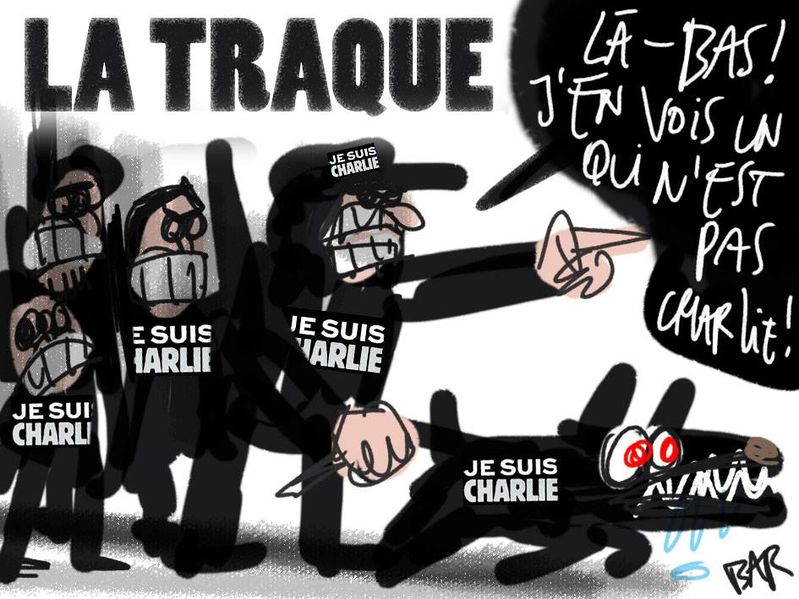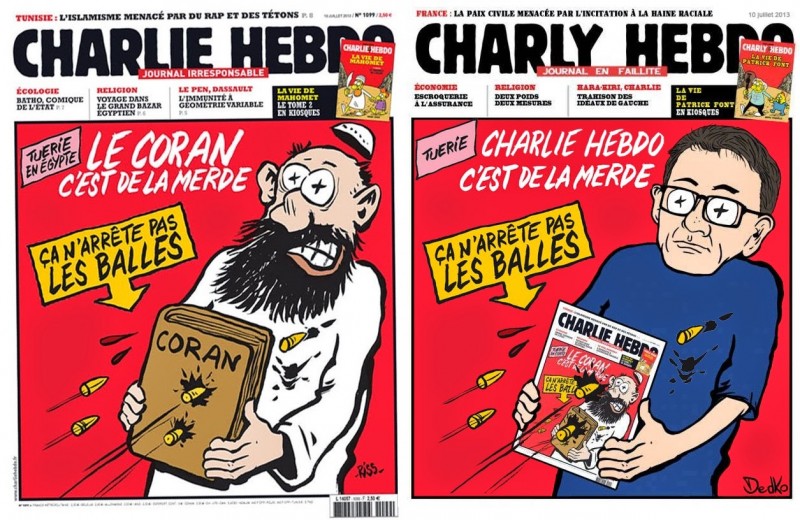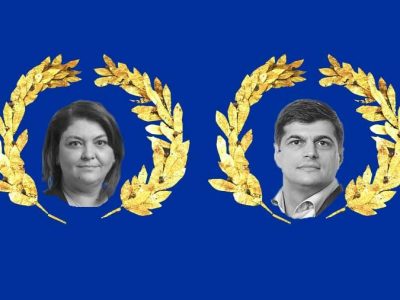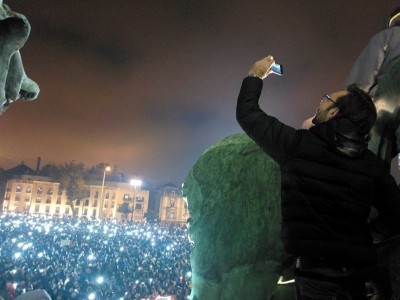
“There! I see one that isn't Charlie!” Cartoon posted to Encyclopedia Dramatica by user Patlalrique. Copyright free.
Authorities have unleashed an unprecedented wave of arrests throughout France for “advocating terrorism” since the attacks that left 17 dead in early January, demonstrating what some call unprecedented hostility in a country with such a longtime tradition of defending freedom of expression. Officials have asked judges and prosecutors to come down hard on those found to have defended or publicly praised terrorist actions or organizations.
As of January 21, 117 criminal proceedings had been filed against French citizens accused of threatening to commit terrorist acts, inciting racial hatred, or “advocating terrorism.” Thanks to a new law from November 2014 that considers the dissemination of messages on the Internet as an aggravating circumstance, “advocating terrorism” can now mean between five and seven years in prison and fines ranging from 75,000 to 100,000 euros. After studying the impact of the new law, legislators said that they had not intended “to repress abuses of freedom of expression, but to punish acts that are directly originating terrorist acts.”
But the wild witch hunt in France seems to be going beyond that intent. The situation is so serious that not only adults are being caught up in the rigorous application of the law, but several children have also been in trouble for the same reason. In Seine-en-Marne, four teenagers will appear before juvenile court on March 25 for posting the following message on Facebook: “We are not Charlie nor will we ever be, bunch of whores. You reap what you sow.”
On January 14, a 14-year-old girl was charged in Nantes for telling off public transport officials, saying “We are the Kouachi sisters, we're going to take out Kalashnikov rifles!” In the same city, a 16-year-old boy was arrested and was released on charges for having published a cartoon satirizing the murder of the Charlie Hebdo cartoonists on his Facebook page. The cartoon in question parodies a cover of the magazine itself, which was published in July 2013 in reference to Egyptian army attacks against the Muslim Brotherhood following the coup there. In the image below, we can see the original cover on the left and the drawing published by the teenager on the right:

On the left, the original cover says, “Massacre in Egypt. The Quran. This is crap. It does not stop bullets.” On the right, the parody says, “Massacre. Charlie Hebdo. This is crap. It does not stop bullets.” Image uploaded to Numerama by user mosquito33, under the CC-by-nc-nd 2.0 license.
On January 8 in Nice, an 8-year-old boy spent several hours at the police station after his school principal reported that he allegedly said, “The French must be killed,” “I stand with the terrorists,” and “The journalists deserved it,” according to the police. The family's lawyer stated that they boy's words were: “I stand with the terrorists because I am against cartoonists who draw the prophet.”
The severity with which authorities are enforcing the law has sparked protests in and outside France. Many have denounced the vagueness of the term “advocating terrorism,” which allows for arrests without any actual crime being committed. Below is the opinion of lawyer and blogger Maitre Eolas, from an interview with L'Obs:
Une enquête terroriste prend beaucoup de temps. […] Ici, après les événements tragiques qui se sont produits, pour de pures raisons de communication, il faut donner l'impression de réagir vite. […] Et comme il est impossible de démanteler un réseau en claquant des doigts, on tape sur les premiers idiots venus qui, immanquablement après ces faits aussi tragiques soient-ils, insultent des policiers en se référant à l'affaire plutôt qu'en employant des insultes plus habituelles.
A terrorist investigation takes a lot of time […] In this case, after the tragic events that have occurred, for simple reasons of communication, it is necessary to give the impression of reacting quickly. […] And since it's impossible to instantly dismantle a network, they first appeal to the idiots who, following these events, however tragic they may be, inevitably insult the police referring to the event instead of using more common insults.
Amnesty International commented on the arrests in a statement, which reads:
Les traités internationaux sur la prévention du terrorisme prévoient la criminalisation de l’incitation à commettre un acte terroriste. Cependant, une notion comme « l’apologie du terrorisme » risque d’être utilisée pour criminaliser des propos tenus sans l’élément intentionnel nécessaire à la définition d’une infraction et sans qu’ils soient directement susceptibles de provoquer des violences de ce type.
International treaties on terrorism prevention provide for the criminalization of incitement to commit a terrorist act. Nonetheless, there is a risk that a notion such as “advocating terrorism” could be used to criminalize statements made without the intentional element required in the definition of a crime, and without them being directly liable to cause such violence.
One well-known figure who has become a target of the law is controversial comedian Dieudonné. Dieudonné, often criticized as anti-Semitic, will have to appear before an anti-terrorism court for posting a caustic comment on his Facebook page about January 11 demonstrations. His comment ended with the phrase, “Know that tonight, as far as I'm concerned, I feel like Charlie Coulibaly”, a mix of the demonstration's slogan and the name of the man who murdered four people in a Jewish supermarket. Later, Dieudonné also explained the meaning of his words on Facebook: “They consider me to be an Amedy Coulibaly, though I am no different than Charlie.”
Nevertheless, some have defended the French government's strict policy. Manbu, for example, left this comment on Numerama's page:
Un peu de prison ne leur fera pas de mal et pourrait même les faire réfléchir à ce vieux précepte: “la liberté (d'expression) des uns s'arrête là où commence celle des autres” ou à l'article 4 de la déclaration des droits de l'homme : ” la liberté (d'expression) consiste à faire tout ce qui ne nuit pas à autrui”.
A bit of prison time won't do them any harm and can even make them reflect on this old precept: “Freedom (of expression) for some ends where it begins for others,” or on Article 4 of the Declaration of Human Rights: “Freedom (of expression) consists of doing anything that does not harm other people.”
A particularly disturbing case is that of Jean-François Chazerans, a philosophy professor at an institute in Poitiers and leftist activist who has been suspended for four months and accused of advocating terrorism after several students’ parents accused him of “disrupting the moment of silence” and “making inappropriate comments in class,” which the professor adamantly denies. Massy Palaiseau left this comment on the Facebook page that was created in support of Chazerans:
Le pauvre…il y a trois mois il aurait montre un exemplaire de Charlie Hebdo a ses eleves il aurait ete suspendu. La c est l inverse. J y comprends plus rien.
Poor man… Three months ago if he had shown a copy of Charlie Hebdo to his students, they would have suspended him. Now it's the reverse. I don't understand anything anymore.
The route that French authorities are taking suggests that freedom of expression is at risk. The tweet below from New York Times writer and columnist Kenan Malik points out the incoherence of this whole issue:
Now, someone remind me, what was that march in Paris last week about? Defence of free speech was it? http://t.co/QF9usdNOMk
— Kenan Malik (@kenanmalik) January 21, 2015




1 comment